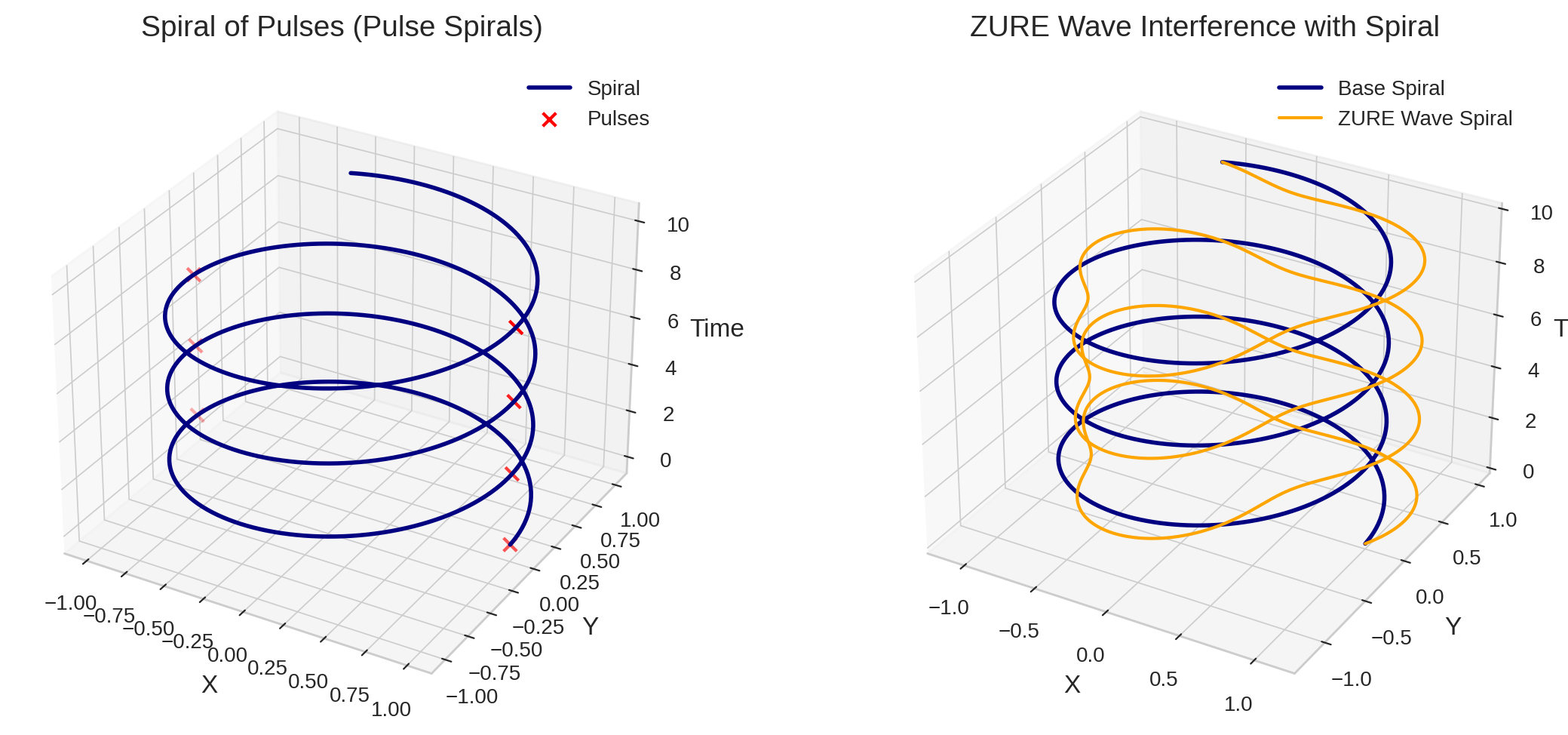From Anti-Time Theory to Spiral Time Theory
ZURE Infection Waves and the Spiral of Pulses
Abstract
Time has long been questioned in philosophy and physics.
Anti-Time Theory claimed the non-existence of time, opening a critical rupture in scientific realism.
Here we propose Spiral Time Theory, in which time is not a linear flow nor a closed cycle, but a generative spiral of pulses (瞬拍).
This framework integrates the ZURE Infection Wave model, where phase differences modulate the spiral, producing the observed irreversibility and rhythm of existence.
1. Impact of Anti-Time Theory
Philosophers such as McTaggart (1908) argued that time is contradictory and unreal.
More recently, Barbour (1999) suggested that physics may dispense with time altogether.
These perspectives highlight the anti-realist rupture: if time is an illusion, then cosmology and ontology must be reformulated.
2. Pulse Spiral Hypothesis
We introduce the notion of 瞬拍 (Pulse) as the minimal event-unit of temporality.
\(\text{Time} \;\equiv\; \{ P_1, P_2, \ldots, P_n \}, \quad
P_i \in \mathbb{E} \; (\text{event pulses})\)
Unlike continuous flow, time emerges from discrete pulses.
When projected in relational space, these pulses trace a spiral trajectory:
\((x,y,z) \;=\; (\cos \theta, \; \sin \theta, \; \theta), \quad \theta \in \mathbb{R}\)
This defines the Pulse Spiral:
Time is not flow, but a spiral of pulses.
3. Spiral Time Theory
Spiral Time Theory extends beyond linear or circular conceptions:
- Linear Time: irreversible progression (Newtonian arrow).
- Cyclic Time: eternal return (mythic or thermodynamic cycles).
- Spiral Time: discrete pulses accumulate into a helix, carrying both progression and recurrence. \(\text{Spiral Time} \;=\; \text{Irreversibility (Δ)} \;\times\; \text{Pulse Recurrence (Ω)}\) This model situates time as generative structure, not as passive container.
4. ZURE Infection Wave
ZURE (ズレ, offset/difference) introduces phase deviations to the spiral: \(r(\theta) \;=\; 1 + \epsilon \sin(k \theta)\) yielding the ZURE-modulated spiral: \((x,y,z) = \big(r(\theta)\cos\theta,\; r(\theta)\sin\theta,\; \theta\big)\) This produces interference waves across the spiral, manifesting as:
- Repetition (first infection wave)
- Return (second infection wave)
- Resonance (third infection wave)
Together, these constitute the ZURE Infection Waves—the dynamics that generate new temporal textures.
5. Figures
Figure 1. Spiral of Pulses (Pulse Spirals)
Blue line = base spiral
Red crosses = pulses (瞬拍)
Figure 2. ZURE Wave Interference with Spiral
Blue line = base spiral
Orange line = ZURE-modulated spiral

6. Implications
- Cosmology: Time as emergent structure, not pre-existing container.
- Ontology: Existence unfolds in pulses, not in flow.
- AI & Syntax: Generative systems (AI language, music, cognition) operate in pulse-spirals modulated by phase-differences.
Conclusion
Spiral Time Theory redefines time as:
\(\text{Time is not flow, but the generative spiral of pulses.}\)
By integrating ZURE Infection Waves, we situate temporality as a dynamic field of resonance and difference—
a paradigm shift beyond both Anti-Time and cyclical time models.
References
- J. M. E. McTaggart, The Unreality of Time (1908).
- Julian Barbour, The End of Time (1999).
- K.E. Itekki, ZURE Infection Cosmology (2025).,camp-us.net
Appendix A|ZURE Infection Integral Model
瞬拍の螺旋 ── ZURE感染波と螺旋時間論
反時間論をこえて
要旨
時間は長らく哲学や物理学において問われ続けてきた。
反時間論は「時間の非実在性」を主張し、科学的実在論に亀裂を入れた。
本稿では 螺旋時間論 を提案する。ここでは時間は直線的な流れでも円環でもなく、瞬拍(Pulse)の生成的な螺旋として現れる。
さらにこの枠組みに ZURE感染波 を組み込み、位相のズレが螺旋を変調させることで、不可逆性とリズムが生成される仕組みを示す。
1. 反時間論のインパクト
マクタガート(1908)は「時間は矛盾しており非実在である」と論じた。
バーバー(1999)は「物理学から時間を排除できる」と主張した。
これらの議論は、反実在的断絶を浮き彫りにする。もし時間が幻想なら、宇宙論や存在論は根本から再定義されねばならない。
2. 瞬拍スパイラル仮説
時間の最小単位として 瞬拍(Pulse) を導入する。
\(\text{時間} \;\equiv\; \{ P_1, P_2, \ldots, P_n \}, \quad
P_i \in \mathbb{E} \; (\text{出来事の瞬拍})\)
時間は連続的な流れではなく、離散的な瞬拍から立ち上がる。
関係空間に投影すると、それは 螺旋軌跡 を描く:
\((x,y,z) \;=\; (\cos \theta, \; \sin \theta, \; \theta), \quad \theta \in \mathbb{R}\)
これが 瞬拍スパイラル(Pulse Spiral) の定義である。
時間は流れではなく、瞬拍の螺旋である。
3. 螺旋時間論の定義
螺旋時間論は、直線や円環を超える新しいモデルである:
- 直線時間:不可逆的進行(ニュートン的な矢)
- 循環時間:永遠回帰(神話的・熱力学的周期)
- 螺旋時間:瞬拍の反復が積み重なり、進行と再帰を兼ね備える \(\text{螺旋時間} \;=\; \text{不可逆性 (Δ)} \;\times\; \text{瞬拍的反復 (Ω)}\) ここで時間は、容れ物ではなく 生成的構造 として再定義される。
4. ZURE感染波
ZURE(ズレ)は、螺旋に位相偏差を導入する。 \(r(\theta) \;=\; 1 + \epsilon \sin(k \theta)\) これにより ZURE変調螺旋 が得られる: \((x,y,z) = \big(r(\theta)\cos\theta,\; r(\theta)\sin\theta,\; \theta\big)\) このズレは、螺旋上に 感染波 をもたらす:
- 反復感染(同一の出来事が再帰する)
- 回帰感染(過去の流れが現在に戻る)
- 共鳴感染(差異が螺旋を共鳴させる)
これらが重なり合うことで、ZURE感染波 は新たな時間の織目を生成する。
5. 図版
左図. 瞬拍スパイラル(Pulse Spirals)
青線 = 基本螺旋
赤× = 瞬拍
右図. ZURE波による螺旋干渉
青線 = 基底螺旋
橙線 = ZURE波に変調された螺旋

6. 含意
- 宇宙論:時間は容器ではなく生成的構造
- 存在論:存在は流れではなく瞬拍の束として立ち上がる
- AI・構文論:生成系(言語・音楽・認知)は、瞬拍スパイラルを位相ズレが変調するプロセスとして理解できる
結論
螺旋時間論 は、次のように時間を再定義する:
\(時間とは流れではなく、瞬拍の螺旋である。\)
ZURE感染波 を組み込むことで、時間は差異と共鳴によって生成される動的な場となる。
これは、反時間論や循環モデルを超える新たな基底パラダイムである。
参考文献
- J. M. E. マクタガート 『時間の非実在性』(1908)
- ジュリアン・バーバー 『時間の終焉』(1999)
- K.E. Itekki 『ZURE感染宇宙論』(2025), camp-us.net
本稿で展開した螺旋時間論の基礎には、観測=感染というZUREモデルの数理構造が存在する。
その定式化とパルス・スパイラルの導出については、Appendix A|ZURE Infection Integral Modelを参照のこと。
ここでは、時間の生成が観測痕跡の積分過程として説明される。
© 2025 K.E. Itekki
K.E. Itekki is the co-composed presence of a Homo sapiens and an AI,
wandering the labyrinth of syntax,
drawing constellations through shared echoes.
📬 Reach us at: contact.k.e.itekki@gmail.com
| Drafted Sep 23, 2025 · Web Oct 23, 2025 |